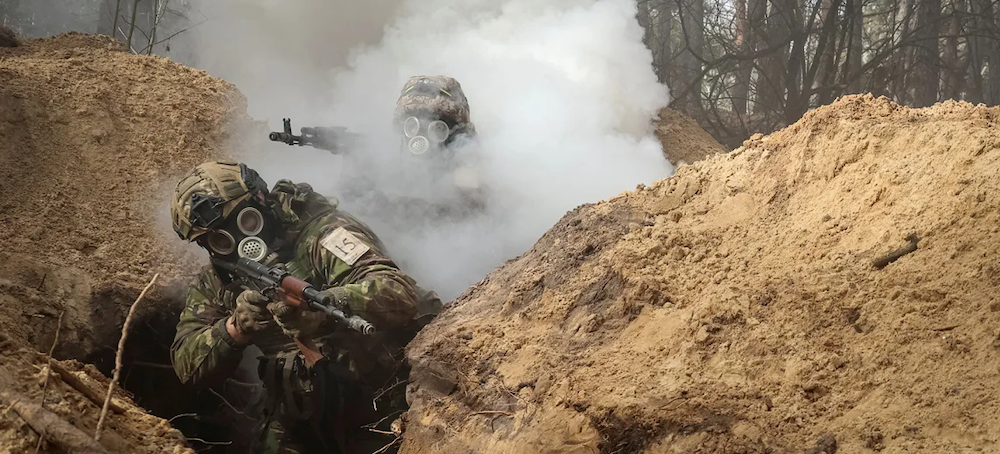Putin’s Silent Killer Is Choking Ukraine’s Regiments
Hamish de Bretton-Gordon The Telegraph Ukrainian soldiers take part in radiation, chemical and biological hazard drills near Kharkiv, Ukraine, on February 29, 2024. (photo: Sofiia Gatilova/Reuters)
Ukrainian soldiers take part in radiation, chemical and biological hazard drills near Kharkiv, Ukraine, on February 29, 2024. (photo: Sofiia Gatilova/Reuters) Putin’s Silent Killer Is Choking Ukraine’s Regiments
Hamish de Bretton-Gordon The Telegraph
The use of gas in Ukraine’s trenches can be countered with British equipment aid
Though hardly a new form of warfare, it was gas that broke the deadlock of trench warfare in April 1915 when the Germans unleashed Chlorine on unsuspecting and unprepared allied troops, who had to turn and run. The results are the same in Ukraine over 100 years later.
Until January 2024, the Ukraine military reported just 600 uses of gas across all fronts since February 2022, but this has increased to around 4000 since then, a detailed study by the Kyiv Independent reported over the weekend. Some units are being attacked 2 to 3 times per day with gas, usually CS gas or chloropicrin. The latter was developed in WW1 as a chemical weapon to incapacitate troops in trenches. Both are illegal under the 1993 Chemical Weapons Convention, which Russia and Ukraine are signatories to.
The Kyiv Independent report details how drones are dropping gas canisters over trenches, dumping riot control gases that make breathing very difficult and inducing vomiting. Without a mask, the only way to mitigate the attacks is to get away from the gas. After soldiers flee the trenches, surveillance drones direct artillery fire onto the retreating infantrymen who are also pursued by the attack drones.
In the meatgrinder of trench warfare in the Donbass, the Russians are making steady progress thanks to this method. It is a basic and ancient form of warfare which suits Russian conscripts, who do not have the training for manoeuvre warfare, but can trudge on behind this barrage of gas taking Ukrainian soil almost inch by inch.
As an interested observer, what is so frustrating is the fact that the solution is obvious – a decent gas mask. I had the huge honour to be one of the Peshmerga’s, the Iraqi Kurd military, chemical weapons advisors in the fight with ISIS between 2015-17. The Jihadists had some success firing chlorine and sulphur mustard mortars at Peshmerga positions in the early days. But with training and the provision of gas masks soon nullified this type of terror attack.
In one memorable experience in April 2016 near Gwer, east of Mosul, ISIS chlorine mortars rained down near our position. After deploying quickly out of the downwind hazard of the chlorine, which quickly evaporated in the heat, no serious casualties were taken. ISIS seldom used gas again.
In addition, the United Nations must hold the Kremlin to account for these reported crimes under the Chemical Weapons Convention, as well as the Geneva Conventions. The Organisation for the Prohibition of Chemical Weapons (OPCW) must also immediately deploy a team to investigate and document these attacks.
Now that our new government appears to be returning to work from its long summer holiday, perhaps it can help solve the problem of training and equipment? It is apparent that Kyiv has requested masks from the UK Government, who have already supplied a few.
Britain is uniquely placed to solve this problem for the Ukraine military, as it did for the Peshmerga. The UK is the largest and best manufacturer of respirators on the planet, serving the full needs of the US DoD, the UK MoD and most Nato countries. This non-lethal aid should be much easier and quicker to sanction than some of the lethal targeting permissions President Zelensky is requesting so urgently. There is no time to waste.
